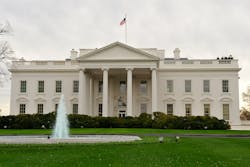In September, the Biden-Harris administration announced that all healthcare workers would be required to get vaccinated against COVID-19. Today, U.S. Centers for Medicare & Medicaid Services (CMS) released its interim emergency regulation.
The federal Centers for Medicare & Medicaid Services (CMS) posted to its website the following:
“The Biden-Harris Administration is requiring COVID-19 vaccination of eligible staff at healthcare facilities that participate in the Medicare and Medicaid programs. The emergency regulation issued by the Centers for Medicare & Medicaid Services (CMS) today protects those fighting this virus on the front lines while also delivering assurances to individuals and their families that they will be protected when seeking care.”
“The prevalence of COVID-19, in particular the Delta variant, within healthcare settings increases the risk of unvaccinated staff contracting the virus and transmitting the virus to patients. When healthcare staff cannot work because of illness or exposure to COVID-19, the strain on the healthcare system becomes more severe and further limits patient access to safe and essential care. These requirements will apply to approximately 76,000 providers and cover over 17 million healthcare workers across the country. The regulation will create a consistent standard within Medicare and Medicaid while giving patients assurance of the vaccination status of those delivering care.”
“Facilities covered by this regulation must establish a policy ensuring all eligible staff have received the first dose of a two-dose COVID-19 vaccine or a one-dose COVID-19 vaccine prior to providing any care, treatment, or other services by December 5, 2021. All eligible staff must have received the necessary shots to be fully vaccinated—either two doses of Pfizer or Moderna or one dose of Johnson & Johnson—by January 4, 2022. The regulation also provides for exemptions based on recognized medical conditions or religious beliefs, observances, or practices. Facilities must develop a similar process or plan for permitting exemptions in alignment with federal law.”
Further, the press release noted, “CMS will ensure compliance with these requirements through established survey and enforcement processes. If a provider or supplier does not meet the requirements, it will be cited by a surveyor as being non-compliant and have an opportunity to return to compliance before additional actions occur. CMS’s goal is to bring healthcare providers into compliance. However, the Agency will not hesitate to use its full enforcement authority to protect the health and safety of patients.”
“The requirements apply to: Ambulatory Surgical Centers, Hospices, Programs of All-Inclusive Care for the Elderly, Hospitals, Long Term Care facilities, Psychiatric Residential Treatment Facilities, Intermediate Care Facilities for Individuals with Intellectual Disabilities, Home Health Agencies, Comprehensive Outpatient Rehabilitation Facilities, Critical Access Hospitals, Clinics (rehabilitation agencies, and public health agencies as providers of outpatient physical therapy and speech-language pathology services), Community Mental Health Centers, Home Infusion Therapy suppliers, Rural Health Clinics/Federally Qualified Health Centers, and End-Stage Renal Disease Facilities,” the release adds.
CMS Administrator Chiquita Brooks-LaSure was quoted in the release saying that “Ensuring patient safety and protection from COVID-19 has been the focus of our efforts in combatting the pandemic and the constantly evolving challenges we’re seeing. Today’s action addresses the risk of unvaccinated healthcare staff to patient safety and provides stability and uniformity across the nation’s healthcare system to strengthen the health of people and the providers who care for them.”
The interim final rule with comment period can be viewed here.


